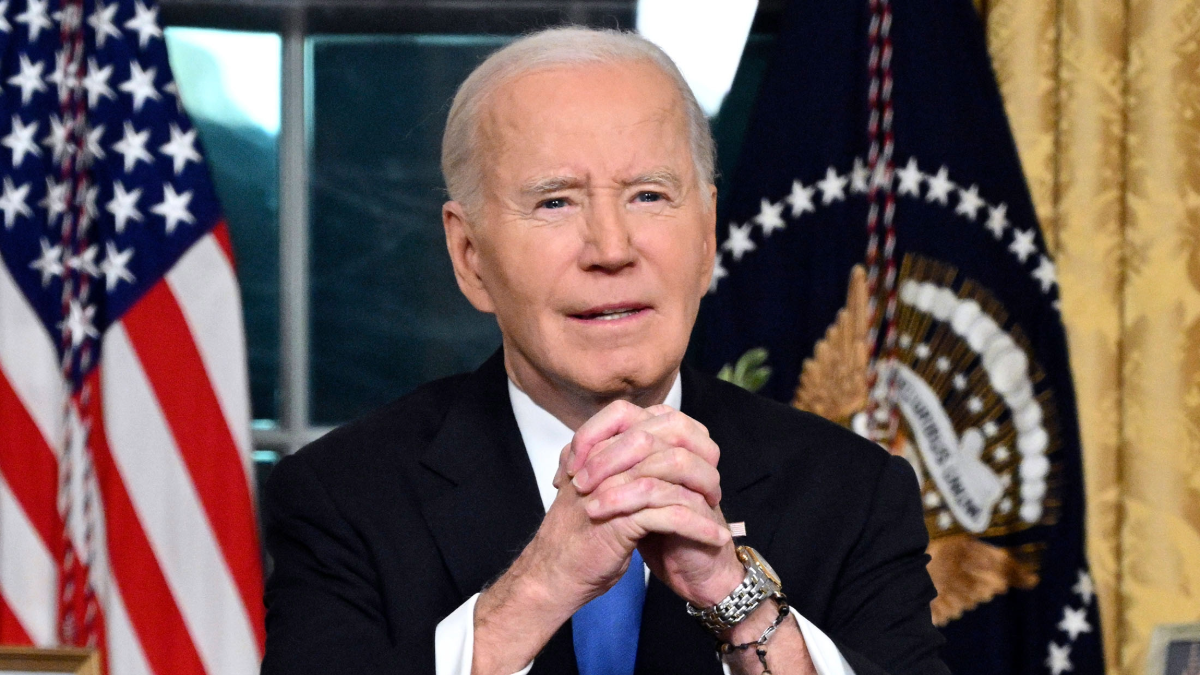Rein In Tech, But Beat China: In His Farewell, Biden Advanced Unreconciled Visions
Graham Webster / Jan 28, 2025
Former President Joe Biden speaks from the Oval Office of the White House as he gives his farewell address Wednesday, Jan. 15, 2025. Voice of America
Former US President Joe Biden left office with an urgent warning about the power of money and the technology industry. In his farewell speech, Biden said that “an oligarchy is taking shape in America” and compared the concentration of wealth and power to the 20th-century robber barons. It was a general warning with broad resonance, but Biden was not done, and he turned specifically to the dangers of the tech industry.
He invoked perhaps the most famous presidential farewell since Washington—Eisenhower’s 1961 warning of an emerging “military-industrial complex” and the “potential for the disastrous rise of misplaced power.”
“Six decades later,” Biden said, “I’m equally concerned about the potential rise of a tech-industrial complex that could pose real dangers for our country as well.” He expressed concerns about misinformation and disinformation, alluded (without naming names) to Meta’s announcement that it was ending fact-checking in the US, and called for “hold[ing] the social platforms accountable.”
In the next breath, however, Biden turned into a nervous cheerleader for those very platforms, at least the ones that develop AI. “Artificial intelligence even has the potential to help us answer my call to end cancer as we know it,” Biden said. “But unless safeguards are in place, AI could spawn new threats to our rights, our way of life, to our privacy, how we work, and how we protect our nation. We must make sure AI is safe and trustworthy and good for all humankind.”
Biden’s hedging, citing both great potential and grave risks, finally gave way to a clear statement in support of US AI development: “In the age of AI, it’s more important than ever that the people must govern. And as the land of liberty, America—not China—must lead the world on the development of AI.”
In just a 10-paragraph passage of his speech, Biden brought forward two visions of technology that both flowed through his presidency. On one hand, reining in the power of tech platforms and beginning to erect safeguards around AI development was a major theme. In this vision, technology and capital run amok could harm individuals, markets, and security. On the other hand, the Biden administration took extraordinary measures through its last days to ensure US technology and the associated centers of capital are ahead of their Chinese counterparts. In this vision, especially in AI fields, the US must empower tech companies and encumber Chinese competitors to ensure democracy, prosperity, and national security.
These ideas are not entirely incompatible. One can favor certain limits on tech platforms while seeking to enable their innovations through light regulation or direct support. In their application, however, these visions conflict when it comes to how to treat companies and the wealthy individuals connected to them.
A vision identifying unchecked social media platforms as threats to democracy and abusers of market power animated the Federal Trade Commission under Biden-appointed Chair Lina Khan and antitrust enforcers in the Department of Justice. The business model that profits from gathering intrusive data on users and leveraging it for ad targeting or outright sale has never been under such frontal attack in the US. Corporate and investor interests were so unhappy with this thrust from the administration that some reportedly lobbied Vice President Kamala Harris to oust Khan if she became president. It was a kind of tech populism wrapped in hotshot lawyering, and it drew enthusiastic support from digital rights supporters and figures on the left. Even some on the right broke with pro-corporate GOP norms to support Khan’s aggressive approach.
Meanwhile, the Biden team put a great deal of energy into another of its tech visions, the need to build and maintain as wide a lead as possible over China in “force multiplier” sectors, including semiconductors, quantum, AI, biotech, and clean energy. When National Security Adviser Jake Sullivan presented this case in 2022, he did so at a conference organized by the Special Competitive Studies Project (SCSP), a subsidiary of the Eric & Wendy Schmidt Fund for Strategic Innovation. Eric Schmidt, of course, is a former CEO of Google and an important policy entrepreneur advocating for greater US government attention to the national security implications of AI and tech competition with China, among numerous other projects. He is also an active investor in AI companies. Meta CEO Mark Zuckerberg, who must be understood as one of Biden’s targets in criticizing the social platforms, also has for years cited competition with China as a reason not to, in his view, over-regulate US platforms. Meta reportedly lobbied quietly but doggedly to ban its Chinese-owned competitor TikTok.
These billionaires are not the only advocates for a strong competitive stance toward China, and their policy stances are not unique to those with vested interests. Concern about Chinese technological power is widespread, especially among people who believe AI systems may soon vastly outstrip human capabilities and revolutionize military power. China’s offensive cyber operations, disclosed by the Biden administration, underline the degree of tech-related peril the US faces in the event of large-scale conflict, and Sullivan’s “force multiplier” frame for key technologies is not without merit. At the same time, there is an unavoidable tension between warning of a tech-industrial complex and advancing policies that are developed with the support of tech moguls and stand to benefit their bottom lines.
The administration’s approach to AI is another example of this tension. Biden’s centerpiece action was the executive order on “Safe, Secure, and Trustworthy Development and Use of Artificial Intelligence,” which incorporated thinking from critics who have long identified abuses of machine learning and other automated systems, as well as concerns that preoccupy many of the technology’s boosters, namely that future AI systems could bring about catastrophic risks. The order sought to ready the government for an AI era, and substantial work went into developing safety testing for AI models. Yet the administration did not take or even strongly advocate binding action to rein in discrimination, bias, or violations of privacy or intellectual property rights. Top executives from developers of large AI models advised the administration and participated in voluntary commitments, but they remained free from substantial binding regulations or safeguards.
The concrete outcomes from these competing visions are broadly in question as the new administration unfolds. President Trump immediately rescinded the AI executive order, Khan is out as FTC chair, and the fate of the Biden administration’s export controls targeting China’s semiconductor industry is uncertain. There was no apparent concern about a tech-industrial complex on Inauguration Day in the Capitol Rotunda, where multiple tech billionaires were seated in front of Trump’s Cabinet nominees.
Like the World War II General Eisenhower, the elder statesman Biden has seen the tensions behind his warning first hand. With luck, Biden’s warning will be more successful than Eisenhower’s.
Authors
